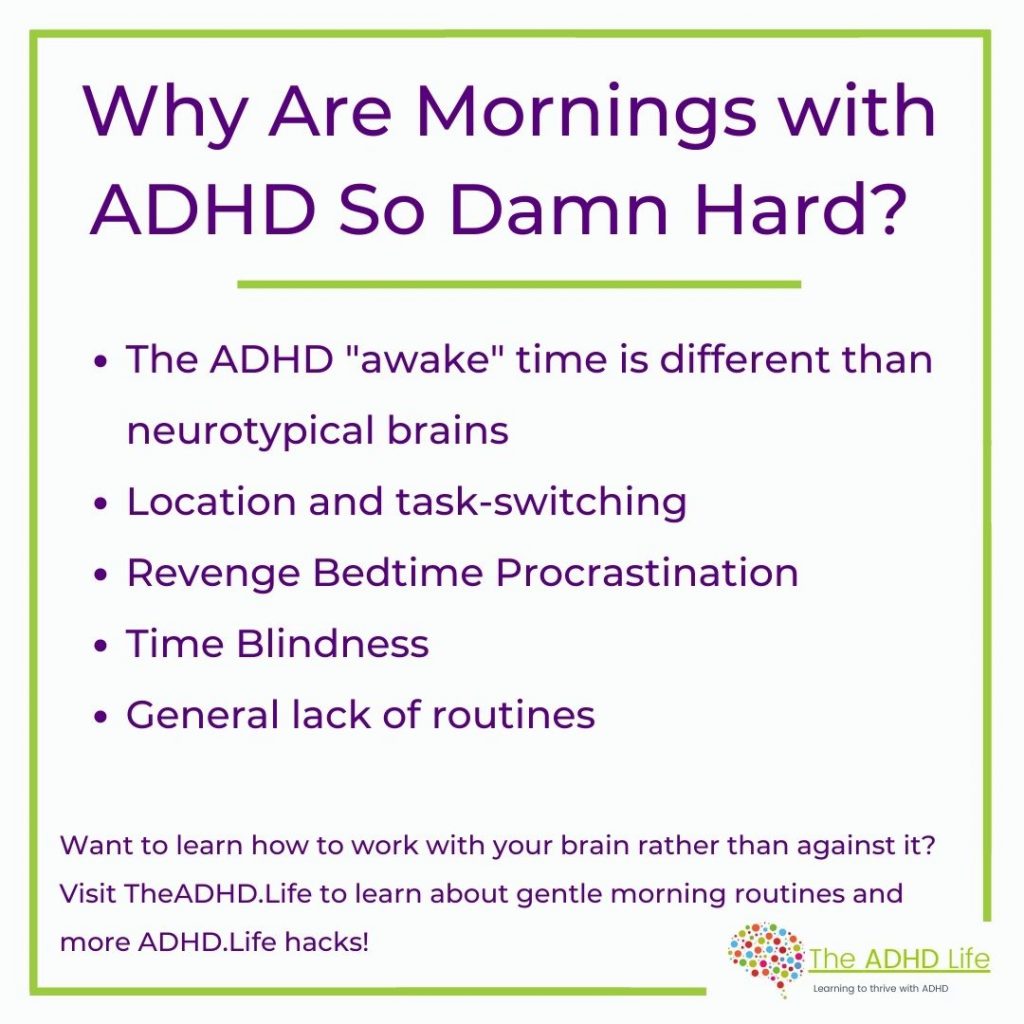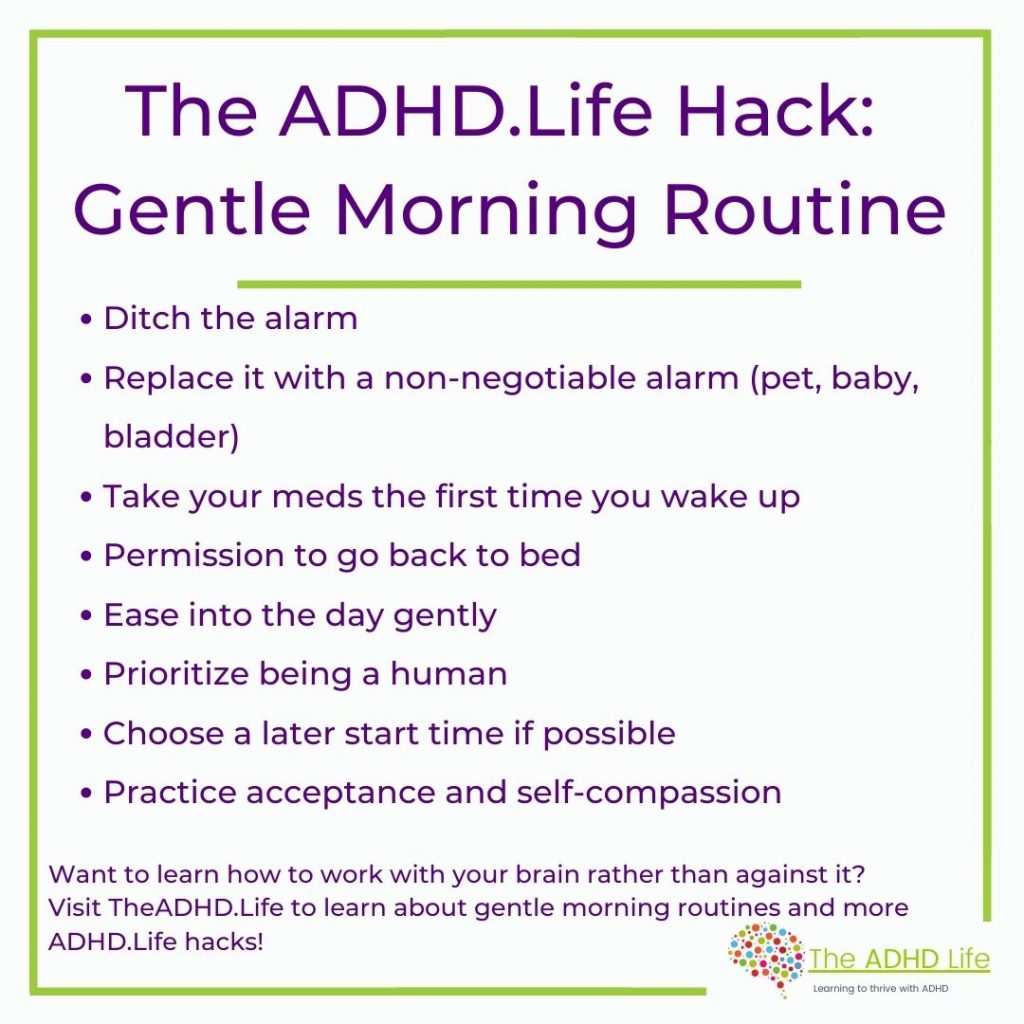People with ADHD don’t need to be convinced of the difficulty that morning presents, or told to just try and set a different alarm,1 to go to bed earlier or try melatonin. If you’re anything like me, you’ve tried a million different routines to magically turn yourself into a morning person who is awake, productive and happy to get to work for the day.
But- what if the answer isn’t a new alarm clock, but ADHD Hacks that work WITH your ADHD rather than against it?

Why are mornings hard for ADHD brains?
I don’t know any “morning people” with ADHD. I do know a lot of people with ADHD who have been trying to be morning people for their entire lives. Typically, despite everything they’ve tried, and failed at, they’ve still been labeled lazy, unmotivated, and worse. It helped me to learn WHY mornings were so hard for me, so that shifting my expectations for myself weren’t wrapped in even more shame and blame at my lack of self-discipline.

- Differences in the “awake” time for the ADHD brain: Typically people with ADHD tend to be most alert and creative in the evenings and late at night. This late night brain activity time means early bedtimes are difficult which cascades into rough mornings. If you don’t go to bed until 3 a.m. it’s going to be rough to be bright eyed and bushy tailed at 8 a.m.
- Location and task switching: these are both difficult for people with ADHD, so once you’re in bed it’s difficult to get out of bed and start on a different location/task. But this also leads to issues with going to bed in the first place.
- Revenge Bedtime Procrastination: This is essentially your subconscious getting revenge for not having enough control of your time during the day, so you put off going to sleep in order to regain some control of your time and life.
- Time Blindness: One part of executive function in a neurotypical brain is the ability to work backwards from what time you need to leave and how long it will take you to get ready. The time blindness in ADHD brains means that getting anywhere only takes 20 minutes (for me at least) but that I don’t even start getting ready until 20 minutes until I need to be somewhere… and then leave when I’m supposed to show up. Essentially, time blindness makes mornings incredibly difficult.
- Lack of routine: This applies to both morning routines and bedtime/wind down routines at night. Routines are hard for the ADHD brain overall, but if your nighttime routine is lacking2 then you’re setting yourself up for impossible early mornings.
I’ve done3 the “get up and get started at 5 a.m.” thing more than once, and it may have worked for a while, but hasn’t ever been sustainable long-term.((But has anything been sustainable long-term?)) Of course consistency is difficult for people with ADHD in general so every “routine” feels destined to only work for a short time before you need a new plan.
What if your routine was designed for your brain?
Lately I’ve been a lot less productivity-focused and have instead been trying to focus on building a more self-compassionate lifestyle. Working with my ADHD instead of against it.4 This helps me have less self-loathing and fewer shame spirals. Essentially, when my expectations of myself meet my actual abilities I just function better.5
To create my ADHD morning-friendly routine I do a couple of different things. Keep in mind that I work for myself, from home, and so my schedule is very flexible. This flexibility is key to my success as a human with ADHD, but can also be a double-edged sword.
My Gentle Morning “Routine”

- Ditch the Alarm: I stopped setting an alarm to wake me up. The pressure of going to sleep “soon enough” to get enough sleep before the alarm went off made it more difficult to go to sleep and stay asleep. It’s similar to when I have a “big important thing” at 7 a.m. that I can’t miss (a flight or appointment) and then I wake up every hour to make sure I don’t oversleep. That anxiety equals awful sleep. I do my best never to schedule anything important before 11 a.m if possible and wake up when my bladder and my dog tell me to.
- Use a physical “alarm”: The dog/bladder alarm is always before I’m *really* ready to get up, but it’s a physical alarm that is relentless.6 I didn’t realize how helpful a dog would be for my ADHD, but turns out an adorable puppy face is pretty hard to resist regardless of my brain.
- Medicate the first time you wake up: When I get up to pee I take my first dose of meds. It’s essential that I keep water in my room and my pills next to my cup((although this bottle with the pills in it already is tempting)) so that I don’t have extra steps since I’m not *really* awake yet.
- Give yourself permission to go back to bed: I’m rarely ready to get going yet so after taking my morning meds I go back to bed. Sometimes I go back to sleep for 20 minutes or so7 but this isn’t *bad* it’s listening to my body and my needs. If I don’t go back to sleep I read, listen to a podcast or audiobook, scroll twitter, cuddle my puppy. I let my brain slowly wake up (with the help of meds.) When knowing I need to go slow is part of my routine/expectation then on the days where I am ready to just meet the day are a *bonus* rather than punishing myself for the usual.
- Ease into the day: Typically I’m ready to get moving 30 minutes later and will get up and grab coffee and take it to the back porch where I allow myself to savor it as I talk to my kids, play with the dog or… keep scrolling twitter. I’ve changed locations, but my brain isn’t fully engaged in work mode yet. This is built into the “routine” and is “allowed.”
- Prioritize being human: About an hour after my typical wake up time I’m ready to shower, get dressed, eat protein for breakfast and move to my actual desk and get to work. My first task is always to journal for at least 1,000 words to get my excess thoughts out onto paper, and make space for the work brain to turn on.8 It’s usually 10 a.m. by the time I’ve gotten to this point, but I’m ready to jump into my “most important” task of the day and trick my brain into hyper-focus mode to get at least one task done. Once that one task is done the rest of the day tends to cascade from there.

More winning, less failing
This gentle routine works with my brain and what the ADHD in me needs. It helps to change my expectations for hyper-productivity and instead focus on what I need as a human first, and the productivity9 follows. It feels magical to start my day off winning rather than already behind because I didn’t get up on on time, or mad at myself for going back to bed. I allow myself to be me, by changing my expectations that I could be anyone else even if I tried.
Accepting that my best isn’t ever going to look the same as all the advice out there for neurotypical brains, has changed my self-perception. Now I see myself as a human who has to work to feed myself and my kids((and the dog)) rather than just a cog in the machine who can never quite get it right and is always overwhelmed and behind.
How do you handle morning transitions? Tips? Tricks? Recommendations? Join the conversation on Facebook and share your ADHD life hacks and connect with other adults who are trying to hack their ADHD!
- this one uses light, sleep analytics and all sorts of other smart tech to help you wake up. [↩]
- Or non-existent [↩]
- or I’ve tried to do [↩]
- I wish this weren’t such a novel concept for me. [↩]
- It’s not rocket science, but it really feels like it should be. [↩]
- and adorable. Well, the puppy part. No idea just how adorable my bladder is since I’ve never seen it. [↩]
- sometimes it’s another few hours [↩]
- I use skwerl.io to race the timer and stay focused on the task of writing and by the time I’m done my brain and body are (typically) both awake, alert and ready to tackle the day. [↩]
- usually, sometimes, on the best days [↩]


